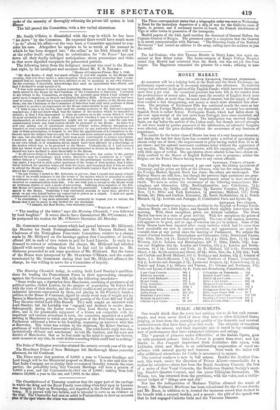Mr. Smith O'Brien is dievatisfied with the way in which
he has been " let down" by the Commons. He expected there would have much more "to do" about his affair—at the very least, a Committee appointed to con- sider his case. Altogether he appears to be as wroth at the manner in which he has been dropped into "the cellar," as his Irish friends will be at the cellar itself; seeing that its substitution for "the Tower" has cast down all their fondly indulged anticipations about processions and visits to that more dignified receptacle for persecuted patriots. The following letter from the indignant recusant was read in the House last night, by his intelligent and accurate friend Mr. E. B. ROCHE- " House of Commons Prison, May 1, 1846.
"My dear Roche—I shall feel much obliged if you will explain to the House this evening, that you were under a misconception when you stated yesterday that I com- plained that no opportunity had been afforded to me of speaking in my own defence. On the contrary, I cheerfully acknowledge that such an opportunity was offered, and that I declined to avail myself of it.
" I was very anxious to have spoken yesterday, because I do not think my case was fairly stated to the House by the Chairman of the Committee of Selection. I referred to my letters to the Committee, as stating the grounds upon which I had refused to serve upon Committees on Scotch and English Railway Bills. If those letters bad been read in artenso, I should have been contented to abide by the opinion of the House upon them; bat the Chairman of the Committee of Selection read only such portions of them as tended to produce an impression on the House unfavourable to my conduct. "I wish it also to be known, that until the closing sentence of Mr. Estcourt's speech reached me, I did not know what was the nature of the motion which he intended to submit ; so that I was unprepared to form an opinion as to the course which it would be most advisable for me to adopt. I did not know whether I was to be Imprisoned or reprimanded, or whether a Committee might not be appointed to take the case into consideration before any final motion should be proposed to the House. As mine is a new case arising out of resolutions adopted without notice, without discussion, not founded on long-established practice, not supported by any authority derived from sta- tute or from prescription, it seemed to me that the appointment of a Committee to de- liberate upon the subject was not only the wisest and most natural mode of dealing with the case, but also that which would have been most conformable to former precedents. I need:not say that my decision with respect to the propriety of addressing the House on my own behalf, or of remaining silent, might have been affected by a knowledge of the motion -which was to be proposed to the House. Undoubtedly, if I had foreseen that my views would have been so much misrepresented in debate as they have been, I should not have declined to state them fully to the House. • .• In all proceedings in Parliament it is customary to give due notice to the parties affected by such proceedings : such notice, therefore, may be considered as a ' right ' rather than as a • courtesy.' With reference to the preliminary motion made on Mon- day night, I was left in such entire ignorance of the terms of that motion, that I abso- lutely mistook the question when put from the chair, and imagined that it was an order to attend the House on Tuesday ; whereas I afterwards learned that it was an order to attend the Committee.
"On last Friday I stated to Mr. Estcourt, in private, that I should feel much obliged to him if he would intimate to me the terms of the motion which he intended to make In reference to my case, as soon as his own determination was formed. I subsequently received no communication from htm. I do not wish you to reveal to the House what an Irishman thinks of such a mode of proceeding. Suffering from injustice of the Bri- tish House of Commons, I expect nothing from its generosity. I shall make no further appeal to the House. Yesterday I was extremely anxious to have been allowed to speak on my own behalf before my committal to prison as a culprit. I shall not again condescend to solicit even this trifling favour. "in concluding, I beg most anxiously and earnestly to request you to inform the House that I am no party to any motion for my discharge. "I remain, my dear Roche, very sincerelyyours, " WILLIAM S. O'BRIEN."
"The reading of the letter," says the Morning Chronicle, "was followed by loud laughter." It seems also to have disconcerted Mr. O'Cosnenix; for he postponed his motion for Mr. O'Brien's liberation till Monday.


















































 Previous page
Previous page